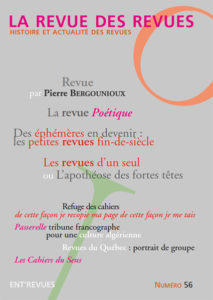par Éric Dussert
2016, in La Revue des revues no 56

Parallèlement à la grande tradition des revues collectives, une catégorie de revues singulières s’est distinguée entre la fin de l’Ancien Régime et le milieu du XIXe siècle – et plus encore durant le siècle suivant, conformément aux évolutions technologiques et éditoriales – par sa liberté de ton, d’esprit et parfois de forme, en tout cas par son extraordinaire variété : la revue uninominale, ou « revue d’un seul ». Rien n’explique vraiment l’ombre où on la tient en tant que phénomène éditorial. Historiquement, et parce qu’elle est le mode d’expression d’un seul individu, la revue d’un seul rédacteur a été remarquée parfois – La Lanterne d’Henri Rochefort (1831-1913) – mais sans toutefois peser très lourd en tant que catégorie spécifique sur le cours de l’histoire littéraire, à de rares exceptions près. De fait, il y eut sans doute un moment de basculement où le caractère individuel de ces revues devint exceptionnel, marginal, où la revue d’un seul ne faisant pas ou plus l’opinion s’est inscrit en faux contre elle, luttant contre la dictature de la majorité et contre les canons esthétiques ou politiques de l’establishment représentés par les « grandes revues » puis par les publications d’écoles esthétiques et de groupes structurés.
The Reviews of A Single Person or the Apotheosis of the Obstinate
Parallel to the great tradition of collective reviews, a category of singular reviews has emerged between the end of the Ancien Régime and the middle of the nineteenth century – and even more so during the next century, following the technological and editorial evolution – characterised by its liberty in tone, wit and sometimes form, in any case by its extraordinary variety: the uninominal review or “review of a single person”. There is no real accounting for the shadow in which it is relegated as an editorial phenomenon. Historically, and because it is the mode of expression of a single individual, the review of a single redactor has sometimes been remarked – La Lanterne [The lantern] by Henri Rochefort (1831-1913) – yet without weighting much as a specific category on the course of literary history, with very few exceptions. Indeed there has no doubt been a moment of turnaround when the individual character of these reviews became exceptional, marginal, when the review of a single person not or no longer making general opinion has inscribed itself as opposed to it, struggling against the dictatorship of the majority and against the aesthetic or political norms of an establishment represented by the “main reviews” and later on by the publications of aesthetic schools and structured groups.